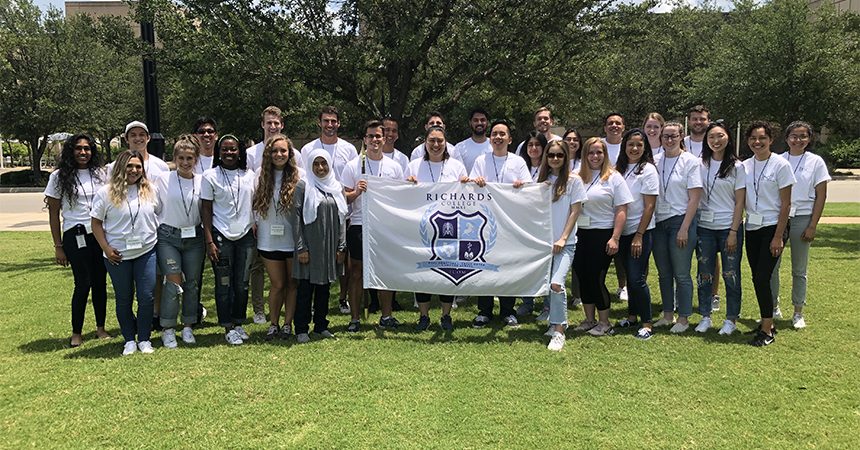TCOM Advisory Colleges celebrate a decade of success
Related Links
Six of the towering figures in the Texas College of Osteopathic Medicine’s history have their names adorning one of the most impactful programs at the school, the Advisory College Program, which is celebrating a decade of success since their introduction in 2011. The TCOM Advisory Colleges are named after Dr. Danny Beyer, Dr. Edward Elko, Dr. Edward Everett, Dr. George Luibel, Dr. David Richards and Dr. T. Eugene Zachary.
For over a decade, the Advisory Colleges have provided a wide array of resources, connections and mentoring for TCOM students. Helping students navigate the treacherous waters of medical school by connecting them with a faculty mentor to give guidance when they need it has provided students wellness and resources.
“The program’s goal to better connect TCOM’s students and faculty, as well as build on those skills that are needed but may not be taught in our formal curriculum,” said Mike Kennedy, EdD, TCOM’s Assistant Dean for Admissions and one of the initial founders of the program. “I hope students find having better access to these resources has helped them stay on the path to higher levels of success.”
So how does it work? TCOM first-year students, sometimes over 230 on a given year, are placed into one of the six colleges where faculty members serve as advisors and mentors. Through the course of their four years, each college will work with each of the over 900 students on activities to promote professionalism, wellness and professional development through one-on-one and group meetings.
Brittney Love, DO, is a TCOM Assistant Professor of Geriatrics, and has a unique perspective when it comes to the Advisory Colleges. She is currently a Beyer College Advisor, but a decade ago, she was a student when the program started.
“I was a member of Everett Advisory College the first year the colleges were in place,” said Dr. Love. “The colleges were great at providing a point of intentional connection between faculty and students, and provided a “home” for students to have access to mentorship with their faculty advisors in both school and non-school related needs. It gave students a great starting point to develop a relationship with a faculty member who would advocate for them and help them navigate (especially the early years) of medical school.”
As one of the original faculty members who remains part of the Advisory Colleges, Damon Schranz, DO, recalled some of the early days of the program.
“The first-year we had the colleges, we were going to Rangers games and all types of sporting events, anything we could think of to release stress,” said Dr. Schranz. “I was one of the younger faculty then so I would always end up being the paint-ball sucker, and I’m not sure anyone else would have done that. It has really morphed for the better, and it’s something that I really love doing.”
Over a decade, the colleges have indeed grown and become an integral part of a TCOM student’s’ success in medical school. Rynn Ziller, EdD, TCOM’s Assistant Dean of the Office of Medical Student Success has seen the Advisory Colleges in action to help many students.
“Oftentimes, our advisors are the ones on the “front-line” with the students and can recognize signs of distress early and refer the student to some of our many excellent resources on campus,” Dr. Ziller said. “Being proactive and addressing problems (whether they be personal or academic in nature) before they become a reason for a student to pause or stop their education is a major benefit.”
“Medical school is hard, and lots of hard work and grace are necessary,” said Dr. Love. “I remember the advisory college lunch meetings, the anxiety before the tests, and the constant practicing for the OSCEs, as well as the residency application process. I hope that I can pass on some of the things that I’ve learned through the process to help encourage them through the difficult times.”
Each college will meet throughout the year as a group for different events, meetings or just to have some fun. The TCOM faculty advisors often become mentors for many students, and watching those students not only grow into the profession, but also as individuals, is at the core of the Advisory College program.
“I think it’s exceptionally meaningful for the faculty who participate in the Advisory Colleges,” said Dr. Love. “All of the advisors are here because they genuinely care about seeing the students at TCOM succeed. I’ve seen the bonds built through the Advisory Colleges last long after the students leave TCOM, which is meaningful for both the student and the faculty advisor.”
“I still keep in contact with a lot of them (students) and serving as a mentor has really been an honor and a privilege,” said Dr. Schranz.
Learn more about the TCOM Advisory Colleges and their advisors here.







Social media